
Abstract: In this article, we discuss the importance of Indigenous traditional ecological knowledge as the foundation of sustainability education, and we describe the need for, and successful efforts to, begin building an Indigenous Traditional Ecological Knowledge initiative at a research university. We share the guiding theoretical framework of our work, and the three goals of the initiative. We note the tensions involved in crafting a vision statement that a diverse group of faculty, staff, and students can all uphold in our collective work. We conclude with a description of our next planned steps for the initiative, and our hopes that this work will help decolonize sustainability education.
Continue Reading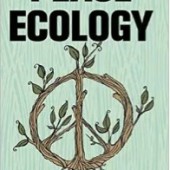
Abstract: Renowned author and professor Randall Amster embraces peace ecology as a way to engage in cooperative actions and practices that build community and foster resilience. Peace Ecology bridges the gap between social and environmental sciences, highlighting important ethical and interdisciplinary aspects of the field of peace studies and showing how these relate to both human communities and the places in which they are embedded.
Amster, R. (2015). Peace ecology. New York: Routledge.
Continue Reading
This opinion/editorial presents the belief that love is present in all human lives as an emotional experience and may be present in all human lives as an intellectual idea as well. It considers possible actualities that lie behind some common thoughts (clichés) about love. The author presents the idea that even though love is central to our lives, the word love, if not the concept of love, is avoided in academic discourse. The author explores some of the scholarly, theoretical, and philosophical writing about love, noting that it is often named something other than love (compassion, well-being, altruism, etc.). The question and invitation are presented to consider what might be possible if love were intentionally and specifically identified as a methodology, pedagogical practice, and value in leadership, activism, and education.
Continue Reading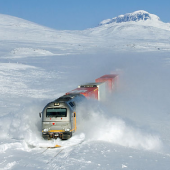
Popular fictional films can support sustainability education by bringing sustainability scenarios to life and appealing to wide audiences. One such film is Snowpiercer, a new film set in the aftermath of an environmental catastrophe. In this review, I cover a variety of themes in the film, discussing how they can be used for sustainability education. The themes include the geoengineering catastrophe that serves as the film’s backdrop and the survivor’s struggles to manage their limited resources. As a warning to the reader, the review also gives away the film’s plot.
Continue Reading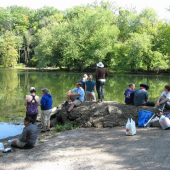
Regional movements toward sustainability recognize that we share a common future. An approach to sustainability education infused with social justice requires joining this common endeavor alongside transformational approaches on individual, community, and larger scales. Transformation occurs most deeply through developing personal relationships with others working in these complex areas. Such relationships humanize abstract issues and build empathy, and they also help learners to better understand and describe ways in which they share similar motivations towards sustainability with others who initially seem quite different from themselves. This paper describes how a residential and experiential undergraduate semester in sustainability studies used personal encounters with a diversity of actors in our watershed to illustrate the range of people who must be considered and included in moving toward regional sustainability. Engaging a broad spectrum of people enables students to acknowledge the need to move forward alongside those who are different from and similar to themselves in various ways, redefining “them” as “us” within the watershed.
Continue Reading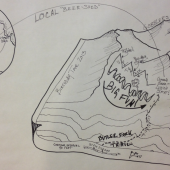
The socioecological challenges we face have never been so complex, so intractable, and so urgent. And while both justice-oriented education and education for sustainability are growing in colleges and universities across the United States, normative perspectives of outdoor experiential education have fallen embarrassingly behind. In this paper, we offer critical sustainability as a conceptual basis for engaging students in the beauty, perversity, and complexity of our world. Critical sustainability, integrating sociopolitical systems of privilege and oppression with the socioecological imperatives of global health and justice, provides an exciting and promising pedagogical direction. With this conceptual framework, we explore perspectives of “nature,” placefulness, and our multiple, overlapping subjectivities as students, educators, and engaged citizens. Our task as outdoor educators is to bring the faraway nearby and inspire students to engage in the myriad challenges we face as individuals, citizens, and as members of a global ecological community. We conclude by offering place mapping as a pedagogical technique to support elements of critical sustainability in outdoor education settings and beyond.
Continue Reading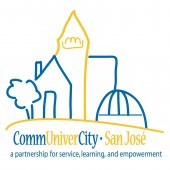
Experiential learning, and more specifically, service learning (SL) can serve as an ideal mechanism to support sustainability education. In particular, because of its emphasis on collaboration between students, faculty, and the community partner(s) and on social change and civic engagement, SL provides an excellent vehicle to address issues related to social justice. In this article, we document a unique SL partnership at San José State University—CommUniverCity. CommUniverCity’s primary mission is to build social capital and empower residents in an underserved community near the university. Each year, students, faculty and residents invest more than 21,000 hours in service to the community. Because of its unique mission, sustainability-related projects lie at the heart of what CommUniverCity does. We analyze student surveys from more than 30 classes engaged in SL projects during 2012 across a wide range of disciplines. All projects address at least one, and often multiple “Es” of sustainability. Our findings indicate that students find value in the SL experience, not only in terms of better understanding of the course subject matter, but also in terms of their understanding of “community” and the larger issue of social justice and equity.
Continue Reading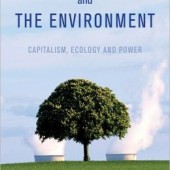
Tina Evans explores the multi-faceted significance of this book about the many different ways we must consider the role of power in the process of globalization. Her review gives us a taste of how broadly Newell defines governance and sees the role of power among state and non-state institutions at many different levels. The relationships among business, governments, trade, finance, capital and the environment all enter into the overview of this important work provided by Evans.
Continue Reading
If the concept of sustainability is studied at all in middle or high school, chances are that study is taking place in the science classroom. After all, the topic of sustainability is still widely perceived as one of scientific purview: the melting of the polar ice caps, the increase in storm severity, droughts, flooding, and the like. However, I would like to challenge that assumption, and suggest the topic of sustainability be incorporated more broadly, and by more departments than only biology or geography. I would like to invite my colleagues in the English language arts to take ownership of sustainability education, and more closely examine the roles of the economic and societal factors that are directly related to the environmental degradation of our planet. In this paper, I will provide justification for such an undertaking, and also share my own work on inviting student voice and student experience, along with visual media, into the conversation of sustainability education, and more broadly into the conversation of social justice. I will share, through the work of talented secondary students, why sustainability education is the under the purview of all teachers, not just those in the science department.
Continue ReadingThe author constructs a theory of sustainable leadership in contrast to exploitive leadership and argues that all leadership in the modern world falls somewhere on a continuum between these two extremes. The definitions developed for sustainable and exploitive leadership hinge upon the purposes toward which leadership is applied. The concept of sustainable leadership is further […]
Continue Reading
In this rich and robust view of sustainability, Jordana DeZeeuw Spencer accounts for the need to survive in a sustainable environment; at the same time, she takes the concept to another level and calls for a multi-dimensional view where social justice and intentional, inclusive communication are what bring richness to a sustainable life.
Abstract This paper addresses 1) the crucial importance of a multi-dimensional vision and approach to sustainability (Wheeler, 2000) and 2) the human responsibility to work toward that end through a transformation in consciousness and action, which ideally will assist in righting humanity’s relationships with itself, all other beings, and the biosphere. The concepts of sustainability […]
Continue Reading